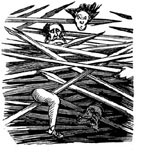
How Much Freedom Can Our Culture Stand?
GUEST COLUMN
The results of a national survey of youth conducted by the Josephson Institute of Ethics were published recently in an article in the Omaha World-Herald. As the article reports:
Almost all high school students (92 percent) and most middle school students (88 percent) admitted to lying to their parents. More than one-third of the students said they would lie to get a good job. About a third of the students admitted to lying on the survey itself. And yet, 97 percent of both age groups said it was important for them to be a person with good character and 91 percent said they were satisfied with their own ethics and character.
Obvious questions arise. If almost all the children would lie to their parents, why would only a third of them lie to a potential employer? (Maybe because your parents don’t check your résumé?) Furthermore, who would believe that only a third of the students are lying on the survey when the nature of a liar is to lie even when he says he is telling the truth? (Or was the question about whether they’d lied on the survey the question to which they’d responded with a lie?) And how can these liars be “satisfied with their own ethics and character”? (Or is that, too, a lie?)
Maybe the youth of America are smarter than the person who thought up the questions for this survey. The students, be it noted, were asked if they were satisfied with their own ethics and character, not if they were ethical or if they possessed good character. Implicit in the question asked is the notion that everyone has his own set of ethical standards. And that is a notion worth examining.
You May Also Enjoy
A proper education enables us to fulfill the Great Commandment, loving God with all our heart and our neighbors as ourselves.
Bloom takes as his model an atheist who is prepared to be deceptive about his beliefs in order to protect his own interests. It seems fair to infer that Bloom is such a person.
At a Christian university, students and faculty should be committed to a search for the truth about the truly good life for man.

